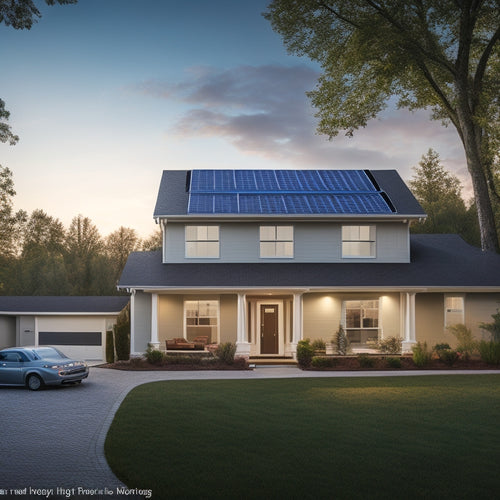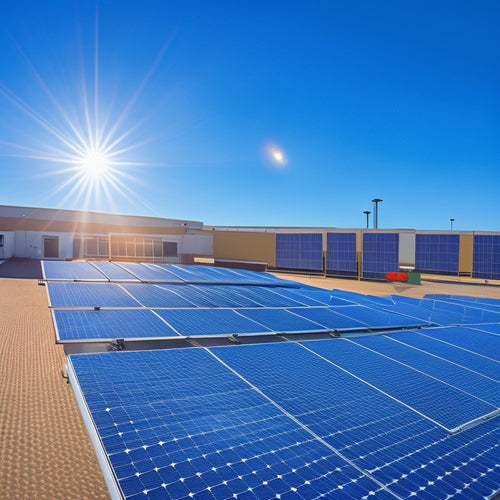
5 Best Residential Battery Systems and Their Prices
Share
You're looking for the best residential battery systems and their prices. Top-rated options like Tesla Powerwall, LG Chem RESU, and Sonnen eco offer a mix of energy independence, home automation, and sustainable energy storage. When choosing a system, consider factors like capacity, depth of discharge, and round-trip efficiency. Prices vary, but expect to pay around $8,000 to $15,000 for a typical residential setup. To find the best fit for your energy needs and budget, dig deeper into the features and benefits of each system, and explore how they can help you maximize your energy storage potential.
Key Takeaways
• Tesla Powerwall, LG Chem RESU, Sonnen eco, SimpliPhi Power, and other top-rated systems provide reliable and efficient energy storage for homes.
• Consider factors like capacity, depth of discharge, and round-trip efficiency when selecting a residential battery system.
• Prices vary depending on the system, with Tesla Powerwall starting at around $8,000 and LG Chem RESU at around $7,000.
• Energy independence and home automation are key benefits of residential battery systems, allowing homeowners to self-generate clean energy.
• When evaluating systems, consider upfront cost, warranty, expected lifespan, and unique features to find the best value for money.
Top-Rated Residential Battery Systems
You'll likely encounter these top-rated residential battery systems when exploring the market: Tesla Powerwall, LG Chem RESU, Sonnen eco, and SimpliPhi Power. These systems cater to homeowners seeking Energy Independence and seamless Home Automation. Each system boasts unique features, but all share the common goal of providing reliable, efficient, and sustainable energy storage.
When evaluating these systems, consider factors such as capacity, depth of discharge, and round-trip efficiency. The Tesla Powerwall, for instance, offers 13.5 kWh of capacity and 92% round-trip efficiency, making it a popular choice for homeowners. The LG Chem RESU, on the other hand, boasts a compact design and high energy density, ideal for smaller spaces. Sonnen eco and SimpliPhi Power systems focus on long-lasting, maintenance-free performance.
When integrating these systems with Home Automation, you can expect enhanced energy management, remote monitoring, and smart grid connectivity. By choosing a top-rated residential battery system, you'll be one step closer to achieving Energy Independence and a more sustainable future.
Cost-Effective Energy Storage Solutions
When selecting a residential battery system, your primary concern is likely the cost, so it's reassuring to know that cost-effective energy storage solutions exist. In recent years, the industry has made significant strides towards achieving Grid Parity, where the cost of renewable energy is on par with traditional fossil fuels. This shift has led to Energy Democratization, where individuals can generate and store their own clean energy, reducing reliance on the grid.
As a result, cost-effective energy storage solutions have become more accessible. You now have a range of options to choose from, including scalable battery systems that can be tailored to your specific energy needs. These systems often feature advanced technologies like lithium-ion batteries, power inverters, and smart monitoring systems. By leveraging these innovations, you can enjoy significant savings on your energy bills while reducing your carbon footprint.
When evaluating cost-effective energy storage solutions, consider factors like the upfront cost, warranty, and expected lifespan of the system. With the right solution, you can harness the full potential of your renewable energy system and enjoy a more sustainable, energy-independent lifestyle.
Reliable Solar Power Backup Systems
Your residential solar power system's reliability depends on a robust backup system, which guarantees a steady supply of electricity even during grid outages or periods of low solar irradiance. This is essential for maintaining grid resilience and ensuring energy autonomy.
A dependable backup system ensures that your home remains powered, even when the grid is down. You can rest assured that your essential appliances, such as refrigerators and medical equipment, will continue to function uninterrupted.
When choosing a backup system, you should consider factors such as capacity, depth of discharge, and round-trip efficiency. A high-capacity system with a high depth of discharge will provide you with a longer backup duration. Additionally, a system with high round-trip efficiency will minimize energy losses, reducing your reliance on the grid.
High-Capacity Battery Options Compared
High-capacity battery options, including Tesla Powerwall, LG Chem RESU, and Sonnen eco, offer homeowners a range of solutions for storing excess energy generated by their solar panels. When selecting a high-capacity battery, you'll want to take into account factors like energy density, battery life expectancy, and overall cost.
Here's a comparison of these high-capacity battery options:
| Battery | Capacity (kWh) | Battery Life Expectancy (Years) |
|---|---|---|
| Tesla Powerwall | 13.5 | 10-15 |
| LG Chem RESU | 3.3, 6.5, 9.8 | 10-15 |
| Sonnen eco | 2, 4, 8, 12 | 10-15 |
When evaluating these options, consider the energy density tradeoffs. For example, the Tesla Powerwall has a higher energy density, making it a more compact option, but also a more expensive one. On the other hand, the LG Chem RESU offers more flexibility in terms of capacity, but may require more space. Ultimately, the best high-capacity battery for you will depend on your specific energy needs and budget. By taking into consideration these factors, you can make an informed decision and maximize your energy storage potential.
Best Value for Money Battery Packs
After exploring high-capacity battery options, you're likely looking for a solution that balances performance with affordability, which is where best value for money battery packs come in. These systems prioritize cost-effectiveness without sacrificing essential features.
When evaluating the best value for money battery packs, you should take into account warranty coverage, which can range from 5 to 10 years, depending on the manufacturer. A thorough warranty guarantees you're protected against defects and premature failures.
Additionally, battery maintenance is vital for extending the lifespan of your system. Look for battery packs with built-in monitoring and control systems that alert you to potential issues, allowing for prompt corrective action.
Other key factors to take into consideration include depth of discharge (DOD), round-trip efficiency, and compatibility with your existing solar panel system. By balancing these factors, you can find a battery pack that meets your energy needs without breaking the bank.
Frequently Asked Questions
How Long Do Residential Battery Systems Typically Last?
As you explore the world of renewable energy, you'll find that residential battery systems typically last between 10 to 15 years, with some high-efficiency models boasting a battery lifespan of up to 20 years, ensuring peak energy efficiency.
Can I Install a Battery System Myself or Hire a Professional?
You can attempt a DIY installation, but make sure DIY safety protocols are in place; however, hiring a professional provides professional oversight, minimizing risks and guaranteeing a safe, efficient, and optimized battery system setup.
Are Residential Battery Systems Compatible With All Solar Panels?
Like a puzzle piece, you're wondering if residential battery systems seamlessly fit with all solar panels. Fortunately, most systems are compatible, thanks to Grid Parity and Inverter Integration, ensuring a harmonious marriage between your solar panels and energy storage.
Do Residential Battery Systems Require Regular Maintenance?
You'll need to conduct regular Battery Health Checks and adhere to recommended Maintenance Schedules to guarantee peak system performance and extend the lifespan of your residential battery system.
Are Residential Battery Systems Covered by a Warranty or Guarantee?
You'll be relieved to know that most residential battery systems come with a warranty or guarantee, ensuring you're protected in case of defects or performance issues, thanks to strict Battery Reliability Standards and Manufacturer Liability regulations.
Related Posts
-

What Do I Need to Know About Farm Solar Panels
When considering farm solar panels, you need to assess costs, benefits, and technical specifics. Initial investment c...
-

Cost of Solar With Battery Backup
You're investing in a solar panel system with battery backup to guarantee reliable power during outages. The cost of ...
-

Essential Solar Panel Mounts for Commercial Properties
When it comes to essential solar panel mounts for your commercial property, durability and wind resistance are key fa...


